|
OF THE WAR |
|
BOND FREE |

|
|
| Pioneer 51st Fighter Group Over 3 Years In India-China |
Maj. Gen. C. L. Chennault, commanding general of the Fourteenth Air Force, sent a letter of congratulations to the 51st Fighter Group on the anniversary of the group's third year of continuous overseas service. The 51st Fighter Group, whose present commanding officer is Col. Louis R. Hughes, Jr. of Kansas City, Mo., was the first
|
In his letter, Gen. Chennault stated "the 51st has written a brilliant combat record in the skies over China, Burma and India. It is a record which I admire greatly and of which every member of your organization has a right to be exceedingly proud."
Chennault commented on the difficulties with which the group was faced in attaining it's outstanding record. The group lost it's aircraft on its way overseas when the aircraft carrier Langley was sunk off the coast of Java where the group had originally planned to land. Being the first United States Military unit to land in India, a total lack of facilities forced it to do its own construction not only upon first landing but also upon arriving at its advanced Assam and China bases. And in China the group has been faced with shortages of gas, spare parts, supplies and facilities.
The General concluded with "I am proud and thankful to have such an outstanding organization as the 51st Fighter Group in my command."
The 51st Fighter Group, also known as the "Flying Horse" Fighter Group is composed of four fighter squadrons, the 449th, 25th, 26th and 16th Squadrons, as well as a fighter control squadron. In 1942 the 25th and 26th Squadrons were rushed to Assam to cover Gen. Stilwell's famous retreat through Burma and to help stem the Jap advance while the 16th went to China where it replaced an AVG unit. The Group was joined a year later by the twin engine 449th Fighter Squadron which had been activated in China. Since first going into combat in the summer of 1942, the 51st Fighter Group has participated in every major action against the Japs from Burma to Hainan Island, Formosa to Hankow.
On these widespread attacks the squadrons have accounted for nearly 250 enemy planes confirmed and over 130 probably destroyed or damaged, not to mention the innumerable planes destroyed on the ground. The Group has also been extremely active against enemy ground installations such as communication centers, supply dumps, troop concentrations, and lines of communication. In one of the Group's busiest months, it dropped such an amazingly high tonnage of bombs that it well might have been called a heavy bomb group.
On January 12 each unit of the Group, scattered though the units were, held a get-together after the day's missions were run, to eat a specially prepared meal washed down with an extra ration of three cans of beer in honor of the men and their Group which had been in combat for thirty odd months and overseas for thirty six.
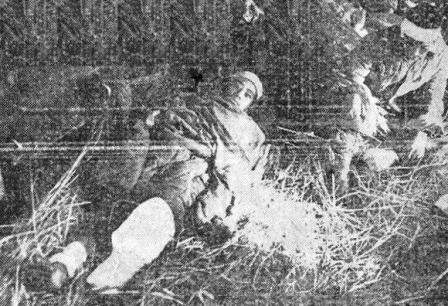 EVACUATION OF WANTING WOUNDED. C-46's of the Troop carrier Command of the 14th Air Force, cooperating
with the Chinese Combat Command, assisting the liberation of Wanting, were cushioned with straw after flying in combat
supplies and used as emergency ambulances in the evacuation of wounded Chinese soldiers.
EVACUATION OF WANTING WOUNDED. C-46's of the Troop carrier Command of the 14th Air Force, cooperating
with the Chinese Combat Command, assisting the liberation of Wanting, were cushioned with straw after flying in combat
supplies and used as emergency ambulances in the evacuation of wounded Chinese soldiers.
|
CCC, 14th EVACUATE
WOUNDED CEF TROOPS
CHINESE COMBAT COMMAND, CHINA - Expert medical aid in close support of the Chinese Expeditionary Force, with speedy air evacuation of the wounded to an American Field Hospital set up well in the rear, was provided by the American liaison personnel of the Chinese Combat Command assisting in the recent liberation of Wanting, final objective of the Salween campaign to open the Burma (now Stilwell) Road.
After receiving first aid at a medical station in the combat vicinity of Wanting, the casualties were rushed to planes of the Troop Carrier Command of the 14th Air Force and speedily flown to a landing field in the rear from whence they were transported to the hospital for immediate attention.
The improvised ambulance planes were C-46s of the Troop Carrier Command which flew in supplies for the fighting forces, were cushioned with straw and the wounded evacuated to the rear.
Bomb Group Sets Up Gunners School
HQ., 14th AF, CHINA - As a means of assisting aerial gunners to maintain a high degree of proficiency against enemy aircraft, the Falcon Medium Bombardment Group has set up a program of training and assistance for these men at its China base.
In addition to the latest devices from the States which simulate combat conditions, the group has built a firing range for the use of the gunners. Unused turrets and other materials have been utilized to give the gunners experience with the equipment with which they work. Deflection shots are emphasized; and it has been found that practice firing on the range enables the gunners to increase their proficiency.
Blindfold tests are given to enable the gunners to locate and remedy malfunctions which might occur
|
The training is being directed by a group of gunnery officers, specially trained for the job in the States.
The Falcon Bomb Group is the oldest medium bomb outfit in China. It has been in continuous action against the Japanese in India, Burma, and China for 29 months.
25,000 TONS MONTHLY
TO CHINA BY LEDO ROAD
NEW YORK - Congressman Mansfield told the House of Representatives last week that within two months China will be receiving a minimum of 13,000 tons of oil and 12,000 tons of supplies every month by the Ledo Road.
As Pres. Roosevelt's personal advisor, he visited the China Theater in November and December.
He added, "I think that before 1945 is out, we will be shipping supplies to China over the 'Hump' at the rate of 100,000 tons a month.
"In the China Theater that amount will be worth four times as much as it would in any other theater."
The pipeline now under construction from Assam to Kunming, he said, will deliver approximately 8,000 barrels every 24 hours.
YOU CAN STILL WIN TWO $100 WAR BONDS
There is still time to win one or both of the two $100.00 War Bonds being offered for a new name for the China Theater newspaper and a design for a China Theater patch.
Both contests are open to all U.S. Military personnel. And the rules are simple.
|
Shoulder Patch Contest
Object: Design for a China Theater shoulder patch. Prize: $100.00 War Bond. Contest Closes: Midnight, March 1st. Mail Entries to: Public Relations Officer, Hq., USF, CTO, APO 879. All entries must contain the sender's full name, rank, serial number, unit, and APO. A contestant may submit as many designs as he pleases. (Neither a dragon nor the color yellow will be considered, although gold is acceptable. Complete and accurate explanations of colors and symbols must be indicated on all entries). |
|
Name Contest
Object: New name for China Theater newspaper. Prize: $100.00 War Bond. Contest Closes: Midnight, February 25th. No limit to the number of entries each contestant may submit. Each entry must be on a separate piece of paper with the contestant's name, serial number, unit and APO. The new name will be on the March 2nd issue of the Command Post. A couple words may win you a $100 War Bond - the easiest C note you've ever earned - so send your entry in today. |
|
Pvt. Merce G. Delgadillo, Corona, Cal., an MP on duty at a Chinese Combat Command installation in southwest China one night when it blacked-out during a visit by Japanese bombers, heard a dog make strange noises in a slit trench which was supposed to be empty. He promptly investigated.
The noise did not lead to an unwarranted visitor, but to a litter of newborn pups.
GI Heir To Land In Kwantung, China
HQ., 14th AIR FORCE FIGHTER WING, CHINA - One GI who doesn't have to wait for the rotation policy to propel him homeward is Corp. Carl Fong, currently touring China as a member of a fighter squadron in the Fourteenth Air Force.
Born in China and reared in San Francisco, Carl is sweating out the eviction of the Japanese from China. The departure of the Nips will enable the corporal to lay claim to a rice plantation owned jointly by himself and his brothers and sisters.
The property was bequeathed to the Fong clan by Carl's grandfather who died in China several years ago. Not much is known of the plantation, except that it is located in Kwantung province near Canton, birthplace of Fong.
News of his inheritance is the last word Fong remembers hearing from his friends and relatives in China. Shortly after his grandfather's death the Japanese began the reign of aggression which ultimately engulfed Kwantung and interrupted the mail run from Canton to Frisco.
Bronze Star To 21 Members Of 14th
HEADQUARTERS, FOURTEENTH AIR FORCE, CHINA - Twenty-one members of the headquarters of the East China Wing of the 14th U.S. Air Force were recently awarded the Bronze Star Medal for distinguishing themselves by meritorious service in connection with sustained combat operations against the enemy from May 28, 1944 to Nov. 7, 1944.
This period begins with the launching of the enemy's biggest offensive of the China War and extends through the battles for the East China bases to the fall of Liuchow base.
Those decorated were: Col. Robert J. Puch, Miami, Fla., Col. John K. Hester, North Little Rock, Ark., Lt. Col. Samuel B. Prevo, Nashville, Tenn., Lt. Col. Oliver H. Clayton, Coral Gables, Fla., Major Edward J. Butler, Auburndale, Mass., Major Duane D. Carlson, Baker, Ore., Major Frank R. Otte, Shaker Heights, Ohio, Capt. Harry D. Fox, Pen Yann, N.Y., Capt. Howard L. Plant, Hartford, Conn., Capt. Charles A. Looney, Jr., Fresno, Cal., T/Sgt. Terence V. Palmer, Jr., Lamoyne, Pa., T/Sgt. Franklin O. Youngborg, Turlock, Cal., T/Sgt. Morton F. Baum, Halcott Center, Greene County, N.Y., S/Sgt. Robert M. Dykstra, Caledonia, N.Y., T/Sgt. Joseph J. Rudis, Chicago, Ill., S/Sgt. Howard J. Miller, Ladonia, Tex., S/Sgt. Ralph R. Hazlett, Sharon, Pa., Sgt. L. A. Caron, Waterbury, Conn., Corp. Warren R. Anderson, St. Paul, Minn., Pfc. Stephen P. Schaffer, Anaheim, Cal., and Pfc. Theodore W. Wright, Jr., Baltimore, Md.
The medals were presented by Col. Clayton B. Claassen, Galveston, Tex., commanding officer of the East China Wing at a ceremony at Wing Headquarters.
|
CHINA TO DRAFT 500,000 BY MARCH
CHUNGKING - More than 500,000 men from unoccupied Chinese provinces will be conscripted before the end of March to meet the Chinese Army's needs for an all-out counter-offensive to coincide with Allied landings on the China coast. |
|
'Pappy,' Fighter Ace, Promoted
HQ., 14th AIR FORCE, CHINA - Lt. Col. John C. Herbst, 36, one of the leading fighter aces of Maj. Gen. C. L. Chennault's Fourteenth Air Force "Flying Tigers," has been promoted from Major. He is credited with 18 Jap planes. Father of an 11-year-old son named Tommy, "Pappy" as Lt. Col. Herbst is known throughout China, once flew against the Germans as a member of the Royal Canadian Air Force. A Nazi swastika on his plane is souvenir decoration although he does not claim victory over the Nazi. His home is Rancho Palomar, Southern California.
| Tengchung Cut-Off Follows 1,000-Year-Old Jungle Trail |
Although in the final stages heavy equipment could be used for cutting and grading the road, most of the work was done by many thousands of coolies using their bare hands and the primitive tools their ancestors were using centuries ago.
Many of the road gangs were made up entirely of Kisu tribesmen - men, women, and children - from the wild mountains between the Salween and the Burma border. Of no definite origin, the Lisus are neither Chinese nor Burmese. The men, reputed to be the greatest human carriers in the world, are skilled hunters, still employing medieval crossbows firing short slivers of bamboo, sometimes dipped in poison.
The cut-off from Myitkyina into Tengchung, although one of the wildest stretches of road in East Asia, reduces the road distance from Ledo to Kunming by more than 100 miles.

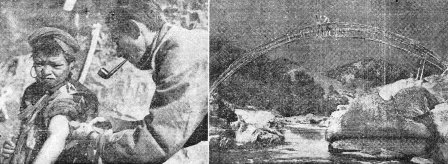 (Left) Chinese coolies working with primitive hand tools, dig into the old Marco Polo trail in the jungled mountains
between the Salween and the Irrawaddy. (Center) With Tengchung an endemic plague area from which many of the tragic
epidemics which have swept China have begun, plague "shots" were administered by American medics to the road workers.
This Lisu laborer takes it philosophically but without liking it much. (Right) In the picturesque mountain country
of the frontier, Americans frequently encounter these strangely shaped bamboo bridges which for centuries have been
the only way of crossing turbulent mountain streams.
(Left) Chinese coolies working with primitive hand tools, dig into the old Marco Polo trail in the jungled mountains
between the Salween and the Irrawaddy. (Center) With Tengchung an endemic plague area from which many of the tragic
epidemics which have swept China have begun, plague "shots" were administered by American medics to the road workers.
This Lisu laborer takes it philosophically but without liking it much. (Right) In the picturesque mountain country
of the frontier, Americans frequently encounter these strangely shaped bamboo bridges which for centuries have been
the only way of crossing turbulent mountain streams.
|
 (Left) Sections of the road were built in the wake of battle, as is shown by this picture of a golden Buddha looking
dfsown enigmatically, on all that remains of a temple wrecked by bomb and shell fire. (Center) Typical of the workers
on the road is the elderly Lisu tribeswoman who will cheerfully, and without sign of strain, do a day's work that would
exhaust most Western men. (Right) The road, twisting like a crazy serpent, swirls around the crest of a mountain
overhanging the narrow ribbon of the Shweli River. In the background stand the even high mountains that form part of
the notorious "Hump."
(Left) Sections of the road were built in the wake of battle, as is shown by this picture of a golden Buddha looking
dfsown enigmatically, on all that remains of a temple wrecked by bomb and shell fire. (Center) Typical of the workers
on the road is the elderly Lisu tribeswoman who will cheerfully, and without sign of strain, do a day's work that would
exhaust most Western men. (Right) The road, twisting like a crazy serpent, swirls around the crest of a mountain
overhanging the narrow ribbon of the Shweli River. In the background stand the even high mountains that form part of
the notorious "Hump."
|
|
Portable ATC Prop Shop Made Of Scrap
1347th AAFBU, INDIA - Take three men, some scrap tubing, a tug, meanwhile stirring slowly with a dash of imagination, and you have the active ingredients for the Portable Prop Shop which is cutting down lost turnaround time due to propeller troubles at this ICD ATC base.
The portable prop shop was dreamed up by T/Sgt. Frank Prabel, Chicago, Ill., ATC Prop Shop wallah here, and Pvt. Frank Collins of West Virginia, prop specialist who, with the aid of Sgt. Hubert Montgomery, Greenfield, Mo., welder, built up a clever crew chief stand of salvaged pipe around an engineering tug.
The stand has a heavy plank flooring, stout enough to hold the weight of three or four men, and every ordinary or special tool incidental to prop trouble-shooting and repair is included in kits handily stowed aboard the tug.
At the first sign of prop trouble the tug is driven out to the plane and positioned under the affected propeller. A spotlight hooked up to the tug's generator facilitates night work, while a removable tarpaulin awning permits repairs, removals and installations on the spot in any and every kind of weather.
T/Sgt. Prable has been with the ATC in India two months and in civilian life was foreman of an oil rig in the western oil fields. Sgt. Montgomery, who was a welder in civilian life, has been over here two months also and is doing the same job in the welding section, while Pvt. Collins has been in India three months and in civilian life operated his own automobile service station.
|
U.S., Scotch GIs Both From Penn.
1347th AAFBU, INDIA - "The old order changeth."
When the cigarette situation got rough around these parts recently, Corp. J.C. Hamilton, Royal Engineers, reversed an accepted Yank custom with S/Sgt. Paul Heinerich, Philadelphia, Pa.
But the joker came when Heinerich mentioned his hometown. Then the rangy Britisher, who hails from Scotland and (of all places!) Pennsy, talked long and eloquently of the Quaker State but especially of the "old days" in Frankfort, Pa., where strange as it sounds, Heinerich and Hamilton soon found that they had once been virtually next-door neighbors.
An employee of the Pennsylvania Railroad Stateside, Heinerich had been with the ATC Air-Freight Section at this ICD base three months before the chance remark started the breeze session going. Hamilton is with a Royal Engineer detachment stationed hard by the base.
And the natives, chum, are just to remind you where you are.
Promotion, Two Awards To Hester
HQ., 14TH AIR FORCE, CHINA - John K. Hester, 28, North Little Rock, Ark., has been promoted to the rank of colonel and awarded the Bronze Star Medal and the Air Medal, according to an announcement from the headquarters of Maj. Gen. C. L. Chennault, Commanding General of the 14th U.S. Air Force in China. Col. Hester is chief operations officer on the staff of Col. Clayton B. Claassen, commander of the East China Wing of the 14th Air Force.
He was decorated with the Bronze Star Medal for distinguishing himself by meritorious service in connection with sustained combat operations against the Japanese in East China. Throughout the Hengyang, Kweilin and Liuchow campaigns, he was responsible for planning operations of the fighter and bomber squadrons under the tactical control of the Wing.
His constant study of enemy movements, situation and capabilities, and his first-hand knowledge obtained through participation in over thirty combat missions enabled him to plan operations resulting in great damage to enemy personnel, shipping and installations, and to delay and seriously harass the enemy.
Officers Awarded Medals By Weart
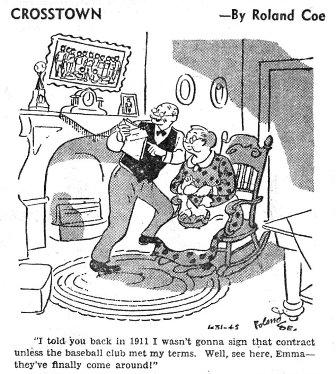
|
A provisional battalion of SOS troops and the SOS band participated in the ceremonies which were held at retreat.
Col. McNeill, a North Carolinian, graduate of the Military Academy at West Point, where he was captain of the baseball team in 1917, received the Legion of Merit for his outstanding service as first commander of the General Staff School for Chinese officers in Yunnan province. The citation pointed out that "his vision and great effort have brought into being a school which has now been accepted by the Chinese and is contributing greatly to the war effort."
Lt. Col. French, Absecon, N.J., was awarded the Bronze Star Medal for his service as assistant Chief of Staff of the former Y-Forces Operations Staff. He attended Lafayette College and in civilian life was in the lumber business in Atlantic City, N.J.
Among the prominent officers present at the ceremony were: Maj. Gen. G. X. Cheves, Maj. Gen. Robert L. McClure, Col. John W. Middleton, Col. Elbert W. Martin, Col. David D. Barret and Col. Edward D. Sirois.
In addressing the assembled troops Gen. Weart stressed the thought that while here were American troops of many different branches and services now on duty in China, that are all working for the same objective. He said the colorful ceremony, in which the troops of several different commands participated, was an example of the cooperation and teamwork for which the China Theater is striving.
| ARC 'Town Club' A Slice Of Times Square In The Orient |
Soldiers from outlying China hostels and camps and men weary from "the chase," evacuators of Hengyang, Kweilin, Muichow and other U.S. bases, congregate in the Town Club for American food, conversation, atmosphere and entertainment. Officers and men use the club during the day; alternate nights are reserved for the separate groups.
Easy chairs, lounge divans, coffee tables, foot stools and an inviting fireplace turn the lobby into an informal lounge. Stacatto news reports inform the soldier audience over the club's broadcasting system of events in the war raging in Europe - and of the closer battle in China.
A message and paging center operates behind the check room and information desk. On the Town Club calendar appear hostel happenings and special events - Rice Bowl Football schedules, Red Cross tours to the Black Dragon Pool and Copper temple, sampan excursions and scheduled performances of "The Little Theater on Yunnan Square," one act plays put on by talented soldiers serving in China.
An archway leads into the games and writing room, with ping-pong tables, billiards and armchair games.
As brightly decorated as a Fifth Avenue cocktail bar is the Burmese Room, work of Sgt. Robert Silva of Forest Hills, N.Y. A Burma landscape covers the four walls: Buddhist temples, tangled jungle fern, bamboo and coconut trees, jungle birds and flowers dabbed in brilliant pinks, greens and yellows complete the Burma foliage and form a pattern for the murals that extend to the ceiling. Frosted fixtures trimmed in silver supply the lighting.
Within the restaurant are served some 17,000 meals and snacks monthly, a remarkable accomplishment considering that all cooking is done on two clay charcoal stoves; a feat to amaze any hotel manager in the States.
The building, although modern in appearance, has no occidental hotel facilities; there is no basement; no service space; no heating equipment; no water supply; no gas stoves. In spite of these handicaps, the Red Cross girls and their Chinese aids serve some 500 full-course American meals daily.
Water supply is a major problem in China. The Town Club is the only place in town authorized by the Army to serve drinking water. An Army fire truck operates 24 hours a day hauling water to the club to fill oil tanks improvised for dishwashing; coolie backs carry buckets of water on sticks to be boiled and used for coffee.
These are a few of the problems that present themselves to Red Cross girls operating a club "at the end of the line."
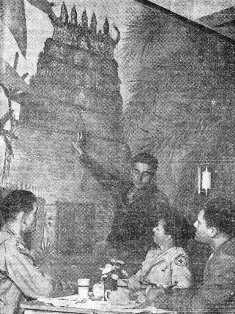
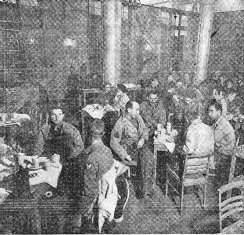
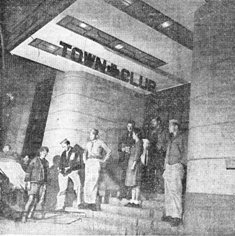
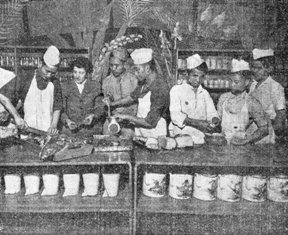 Upper Left: Sgt. Robert Silva, Forest Hills, N.Y., explains to Peg Lea, Red Cross girl from Manhasset, N.Y., the
Buddhist temple he muraled on the dining room wall of the Town Club. Upper Right: Officers and men fill the Burmese
Room where over 500 meals and snacks are served daily. Lower Left: Entrance to the Town Club, meeting place for
American soldiers from every corner of Free China. Lower Right: Flora Coutts, Newport, Vt., club director, gives her
Chinese cooks the secret of American hamburgers.
Upper Left: Sgt. Robert Silva, Forest Hills, N.Y., explains to Peg Lea, Red Cross girl from Manhasset, N.Y., the
Buddhist temple he muraled on the dining room wall of the Town Club. Upper Right: Officers and men fill the Burmese
Room where over 500 meals and snacks are served daily. Lower Left: Entrance to the Town Club, meeting place for
American soldiers from every corner of Free China. Lower Right: Flora Coutts, Newport, Vt., club director, gives her
Chinese cooks the secret of American hamburgers.
AMERICAN INDUSTRIAL SYSTEM TO BOOST CHINA'S PRODUCTION KUNMING - How to increase local production of supplies sorely needed in the war effort and to get fullest returns from Free China's admittedly limited industrial capacity - these are the knotty problems now being tackled by the Chinese War Production Board, and the Donald M. Nelson Mission, guided by experience gained by the staff of the Services of Supply, China Theater. Following a policy of procuring items required by Unites States Forces within the theater when practicable, Col. Bruce E. Vaughan, Washington, D.C., Chief of the Central Purchasing and Procurement Authority, has supervised the buying of hundreds of articles, from eggbeaters to cement for airfield runways, throughout China. Due to the need of conserving transportation facilities these have been procured as near to the point of use as possible. "Many of the ideas which we are proposing for action by the Mission and by Chinese leaders can contribute to the advancement of this country after the war," says Col. Vaughan, "and we believe that, by helping the Chinese to help themselves we are supplying the soundest and most lasting kind of international aid." The arrival of the Nelson group, directed specifically by the President to advise means of increasing Chinese production, presented a new opportunity to cash in on Army experience. Services of Supply prepared for Mr. nelson a list of items which it believed should be available but which were difficult to obtain in satisfactory quantities. Also prepared was an economic survey to China productive capacity, assembled by the Resources Section of CF and PA, said to be the most accurate analysis of its kind. This established a tangible program on which the mission and WPB can operate. Joint American-Chinese SOS Will Fill 'Lao Ping' Needs KUNMING, CHINA - The new Chinese Army Services of Supply headquarters was opened here last week in a ceremony at which Maj. Gen. G. X. Cheves, commanding general, SOS, USF, China Theater, and Gen. Lu Tsu, deputy commander of the Chinese SOS, received the officers of their combined and integrated staff. The Chinese SOS is manned by both American and Chinese officers and men, an is designed to carry out the plans of Generalissimo Chiang Kai-shek and Lt. Gen. A. C. Wedemeyer, commanding general of U.S. Forces in China, for better food, clothing and equipment for the Chinese fighting forces. Directly under Gen. Ho Yingching, chief of Chinese general staff with headquarters in Kunming, the new Chinese SOS will be headed by Gen. Cheves with Gen. Lu as deputy commander and Col. Mason H. Lucas, Lawton, Okla., as chief of staff. There are eight departments set up in the Chinese SOS headquarters including planning, headquarters, administration, personnel, signal and transport, quartermaster, food, ordnance and medical. At the ceremonies a guard of honor and band were inspected by Gen. Cheves and Gen. Lu. In introducing Gen. Cheves, the cooperation and friendship between the two countries as indicated by the close working arrangement in this new headquarters was stressed by Gen. Lu. "Gen. Cheves has had abundant experience in organizing supply functions," said Gen. Lu in his introduction. "Now our National Army is ready to take the offensive and the rear is not less important than the front. The Generalissimo has appointed Gen. Cheves to take this responsibility and under his leadership we believe we shall accomplish important results. I feel honored to serve as deputy commanding general and will do my best to fill my responsibility." In reply Cheves made a plea to "keep faith with the Chinese soldier and give him what he needs."
"LINES ON CHINA" BY VAN HEUKLYN Corp. Howard B. Van Heuklyn, 22-year-old architectural draftsman from Glendale, Cal., now assigned to the mapping section of a photo technical unit of the 14th Air Force, is the cartoonist responsible for the "Lines On China" drawing in this issue of the China Command Post. A graduate of the University of Southern California and now specializing in Chinese architecture for his master's degree. Van Heuklyn will be a regular contributor to the Command Post. 'Canvas Cover' Club Opens At China Base HQ., 14th AF, CHINA - The only canvas Red Cross Club in the China and India-Burma Theaters was formally opened recently at a China U.S. Air Base. Appropriately enough, the name "Canvas Cover Club" was selected from a host of suggested names and a gift of a box of canned foods was presented to S/Sgt. Pat Tuscano, Myersdale, Pa.; Corp. James Lynn, Chester, Pa. and Corp. Robert Campana, Brookline, Mass., who jointly submitted the prize winning name. The club is composed of two hospital tents, one containing the kitchen, snack bar and tables, and the other a juke box, radio, ping-pong tables, writing desks and books. The club was established by two Red Cross hostesses, Miss Betty Smoth of Racine, Wis., and Miss Rita Pilkey, Dallas, Texas. Maj. Gen. Gilbert X. Cheves, SOS commander, furnished the club with a juke box, radio, records and ping-pong tables. He also provided the box of canned goods which was given as a prize for naming the club. First Sergeant Clinton D. Shipley of McClellandtown, Penn., chairman of the club committee, opened the dedication ceremony with a speech of acceptance and Lt. park L. Myers, Austin, Tex., and his "Fatigue Hatters" orchestra supplied the music. Maj. Thomas F. Hartnett, Evansville, Ind., the base commander, expedited the establishment of the club and smoothed out many difficulties in the matter of supplies and material.
Pons Troupe Regrets Missing Some Bases Having completed the 25-day stay allotted them in the China Theater, the Lily Pons-Andre Kostelanetz troupe departed this week to play two more shows in the India-Burma Theater and then proceed to the ETO for a concert tour there. Within the limits of travel conditions and the weather, the troupe performed before as many of the troops in this theater as possible, reaching an estimated 60 to 75 percent of the personnel. It was with extreme regret that they were unable to play before the U.S. Forces at all U.S. bases but weather conditions made that impossible. In a statement signed by the entire troupe and issued to the Command Post they said in part: "To the U.S. personnel in China, we wish to say that we appreciate the inspiring reception extended to us, and we regret exceedingly that we could not visit all the bases and installations where you are on duty. "The schedule which was presented to us in China appeared to be one that would take us to most of the installations but bad weather prevailed and day by day we were informed that there were cancellations and adjustments. "We came here to do the best and most complete job possible, and within the limits of travel and weather we have accomplished our mission. To those in China whom we could not reach we want you to know that we had most sincerely desired and definitely expected to be with you." 'All Request Parade' Featured By XNEW The "All Request Parade" featuring the music of the outstanding Stateside orchestras and the singing of the nation's top vocalist, as requested by the GIs in the China Theater, is being presented each Saturday night at 2215 hours over the facilities of Station XNEW. Station XNEW had on hand the widest selection of recording of orchestra both sweet and swing, and the vocals of the leading singing sensations, so as to be able to comply with the requests. All requests must be by mail and should reach Station XNEW by Friday of each week to be included in Saturday's broadcast. Letters requesting songs should be addressed to Station XNEW, Kunming, China.
"Sylvester's Circus" Makes Records In Three Theaters 1343rd AAFBU, CHINA - "Here today and gone tomorrow" truly sums up the capabilities of the 2nd Air Transport Squadron (Mobile), one of the recently activated, self-contained air cargo units, the existence of which has only lately been released from the secret list. Known as "Moby Dick" squadrons, code name by which they were designated while in the planning stage, they possess the essential virtues of speed, astounding capacity and flexibility. On a moment's notice they are able to fold up shop, "lock, stock and barrel," load into their 20 Curtiss Commandos, flying hundreds of miles and set up complete base housekeeping within a few hours after landing on a newly captured field or wherever they may be ordered. The 2nd ATS, second of the new units to go overseas, carries the handle of "Sylvester's Circus," named after its commanding officer, Maj. Frank Sylvester, Santa Barbara, Cal., formerly group operations officer with the Ferrying Division stationed in Palm Springs, Cal. Since its arrival in this theater, November 21, 1944, the "Circus" has gained a reputation for efficiency and the speed with which its distinctive yellow nose planes have carried out dangerous, behind the Jap lines, evacuations. Recently the Suichwan and Kanchow missions were accomplished without the loss of a single aircraft, although the pilots of the lumbering Commandos often looked down on active Jap fighter fields. The outfit is extremely mobile. When the order to move comes, its elaborate engineering and communications workbenches and shops are folded up and packed. The operations section goes into five footlockers . . . the orderly room and command section into three boxes. Mess equipment and enough food to last the squadron several days is assembled. Ordnance and supply goes into 12 boxes . . . six jeeps and trailers, two engineering tugs and one fork lift are packed in place. Special Service - in two boxes - and an officers and NCO club, on paper . . . even a portable laundry, invaluable in China, are tucked away, and the outfit is ready to take off. "Sylvester's Circus" is the only Moby Dick outfit that has seen service in three theaters: North Africa, India, and China. The last 'permanent' change of the outfit was accomplished in the short space of 10 hours, and on the same day dispatched 13 of its ships for Hump operations. The "Circus" is in receipt of nine official commendations including those from Brig. Gen. Laverne Saunders and Maj. Gen. Curtis LeMay, former generals of the XX Bomber Command, Gen. Henry Arnold, commanding general of the Air Forces, and Brig. Gen. William Tunner, commanding general of ATC. Engaged in important troop movements, rescue work, reverse Hump operation and extreme forward area missions, the squadron's records tell the story of a high state of discipline and morale. 
The CHINA COMMAND POST is the weekly newspaper of the United States Forces in the China Theater and is published by Lt. Lester H. Geiss, Editor-in-Chief, for military personnel only. T/Sgt. Harry Purcell, Managing Editor; Sgt. Maurice Pernod, Production Chief. Editorial offices: Hqrs., SOS, China Theater, Kunming, China, and Hqrs., SOS, Calcutta, India. Printed by Ajit Kumar Sinha at the "Amrita Bazar Patrika" Press, Calcutta, India. 
FEBRUARY 23, 1945 Original issue shared by CBI veteran Grover P. Fike Copyright © 2008 Carl Warren Weidenburner TOP OF PAGE PRINT THIS PAGE ABOUT THIS PAGE E-MAIL YOUR COMMENTS CLOSE THIS WINDOW |
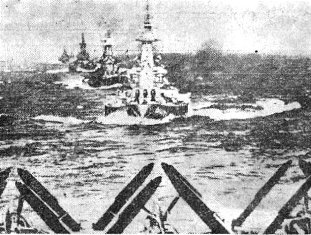 Taken from a U.S. aircraft carrier whose planes can be seen in the foreground, this picture shows a line of U.S.
battleships steaming ahead "somewhere in the Pacific." U.S. carrier planes hit targets in the Tokyo area,
while battleships bombarded Iwo Jima, 50 miles to the southeast. (Radiophoto)
Taken from a U.S. aircraft carrier whose planes can be seen in the foreground, this picture shows a line of U.S.
battleships steaming ahead "somewhere in the Pacific." U.S. carrier planes hit targets in the Tokyo area,
while battleships bombarded Iwo Jima, 50 miles to the southeast. (Radiophoto)
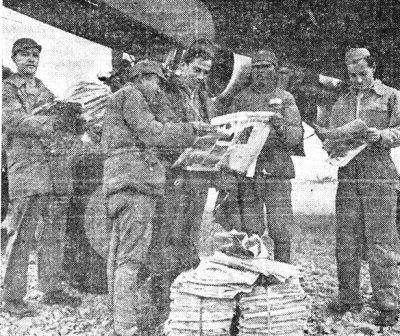 Field personnel at the airport eagerly read the first issue of the Command Post to arrive in China while a Chinese soldier curiously examines the new Theater publication. Pfc. Orlando C. Seese, left, of Mentor, Ohio, starts the circulation machinery in motion while Pvt. August E. Hoffman, Pittsburg, Pa., and Sgt. Thomas F. Lynch, Farmington, Minn., read the latest news.
Field personnel at the airport eagerly read the first issue of the Command Post to arrive in China while a Chinese soldier curiously examines the new Theater publication. Pfc. Orlando C. Seese, left, of Mentor, Ohio, starts the circulation machinery in motion while Pvt. August E. Hoffman, Pittsburg, Pa., and Sgt. Thomas F. Lynch, Farmington, Minn., read the latest news.





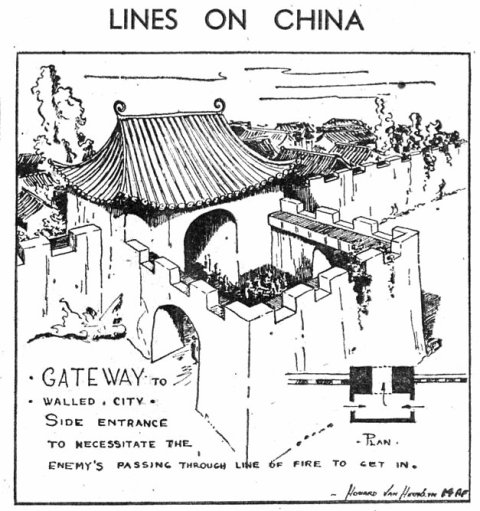
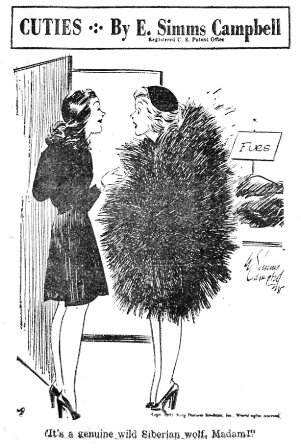
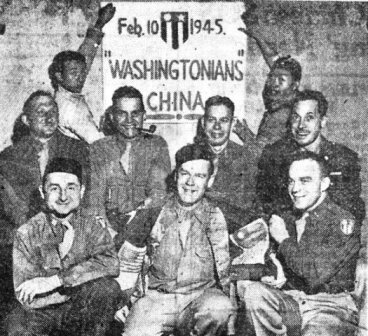 WASHINGTONIANS IN TEALAND. Officers and enlisted men from the District of Columbia recently got together
at a Kunming restaurant for a reunion dinner. The self-labeled "Washingtonians In China" are, left to right:
Front row, Capt. Isadore Fein, Capt. Joseph W. Marshall, Lt. Don F. Riordan. Back row, T/Sgt. Jacon Wilwit, Maj.
Donald A. Falk, Maj. Milton E. Wertz, and Capt. Stanton F. Lang.
WASHINGTONIANS IN TEALAND. Officers and enlisted men from the District of Columbia recently got together
at a Kunming restaurant for a reunion dinner. The self-labeled "Washingtonians In China" are, left to right:
Front row, Capt. Isadore Fein, Capt. Joseph W. Marshall, Lt. Don F. Riordan. Back row, T/Sgt. Jacon Wilwit, Maj.
Donald A. Falk, Maj. Milton E. Wertz, and Capt. Stanton F. Lang.
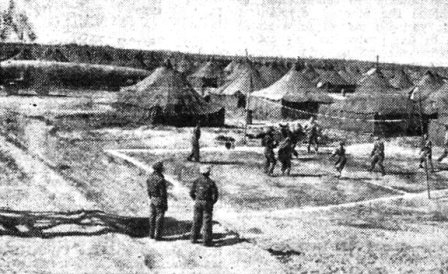 Even the camp of the 2nd Moby Squadron has that Ringling Brothers "ready to move" composite look. Here a couple
of the "Yellow Nose" pilots watch a volleyball game, while in the background are the tents for living quarters. Left
is an old fuselage made into a restaurant.
Even the camp of the 2nd Moby Squadron has that Ringling Brothers "ready to move" composite look. Here a couple
of the "Yellow Nose" pilots watch a volleyball game, while in the background are the tents for living quarters. Left
is an old fuselage made into a restaurant.
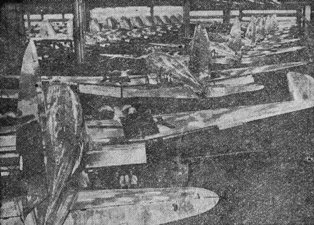 "COMMANDO" VOLUME UP. Complete frames of C-46 Commando transports move along a U.S. assembly line ready for
installation of motors. News of the exact production schedules of the planes are restricted. C-46s are being built
in greater numbers than any other U.S. transport plane.
"COMMANDO" VOLUME UP. Complete frames of C-46 Commando transports move along a U.S. assembly line ready for
installation of motors. News of the exact production schedules of the planes are restricted. C-46s are being built
in greater numbers than any other U.S. transport plane.
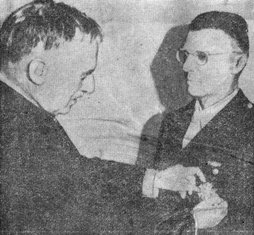 STILWELL AWARDED LEGION OF MERIT. Henry L. Stimson, Secretary of War, presenting the Legion of Merit to Gen.
Joseph W. Stilwell, former chief of the CBI Theater and currently commanding the Army ground forces.
STILWELL AWARDED LEGION OF MERIT. Henry L. Stimson, Secretary of War, presenting the Legion of Merit to Gen.
Joseph W. Stilwell, former chief of the CBI Theater and currently commanding the Army ground forces.
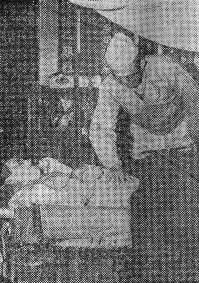 FIELD HOSPITAL. Maj. Jacob Lee, an American of Chinese ancestry and commanding officer of a U.S. Army Field
Hospital in China examines a GI recovering from his appendix operation. Chinese and American soldiers injured in the
Salween campaign were treated at this hospital.
FIELD HOSPITAL. Maj. Jacob Lee, an American of Chinese ancestry and commanding officer of a U.S. Army Field
Hospital in China examines a GI recovering from his appendix operation. Chinese and American soldiers injured in the
Salween campaign were treated at this hospital.
 SMALL ISLANDS STUD LINGAYEN GULF. The 'Hundred Islands' off the shore of Luzon, in Lingayen Gulf, were
skirted by Gen. MacArthur's troops when they landed on the main Philippine island last month. Establishing
four beachheads, U.S. troops pushed inland and wrested four towns from the Japanese within 24 hours after landing.
SMALL ISLANDS STUD LINGAYEN GULF. The 'Hundred Islands' off the shore of Luzon, in Lingayen Gulf, were
skirted by Gen. MacArthur's troops when they landed on the main Philippine island last month. Establishing
four beachheads, U.S. troops pushed inland and wrested four towns from the Japanese within 24 hours after landing.
 GOOD FRIENDS. An American GI and Red Cross worker rigging up a playground swing for youngsters near a
U.S. Army headquarters in China.
GOOD FRIENDS. An American GI and Red Cross worker rigging up a playground swing for youngsters near a
U.S. Army headquarters in China.
 EAR-MARKED FOR CHINA. Awaiting shipment at an Ordnance pool near Calcutta are part of the 15,000 American-made
trucks assigned to China under lend-lease to build up China's transportation system. These trucks will carry
food and war materials over the new Stilwell Road and will remain in China as part of the
recently formed centralized
transportation system, it was announced by Leo T. Crowley, Federal Economic Administrator. The vehicles are
being assembled and processed by SOS troops.
EAR-MARKED FOR CHINA. Awaiting shipment at an Ordnance pool near Calcutta are part of the 15,000 American-made
trucks assigned to China under lend-lease to build up China's transportation system. These trucks will carry
food and war materials over the new Stilwell Road and will remain in China as part of the
recently formed centralized
transportation system, it was announced by Leo T. Crowley, Federal Economic Administrator. The vehicles are
being assembled and processed by SOS troops.
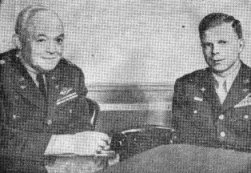 ARNOLD MEETS BONG. Gen. H. H. Arnold, left, CO of the USAAF, welcomed Maj. Richard Bong, highest scoring
air ace of any U.S. service. The 24 year old major recently returned from the southwest Pacific area after
receiving the Congressional Medal of Honor for downing 40 Japanese planes.
ARNOLD MEETS BONG. Gen. H. H. Arnold, left, CO of the USAAF, welcomed Maj. Richard Bong, highest scoring
air ace of any U.S. service. The 24 year old major recently returned from the southwest Pacific area after
receiving the Congressional Medal of Honor for downing 40 Japanese planes.
 JAPANESE SHIP TAKES FINAL PLUNGE. A Japanese merchant ship starts its plunge to the bottom of the sea
after a torpedo attack by planes of the U.S. 3rd Navy Fleet off the coast of French Indo-China. Losses
suffered by the Japanese fleet during the attack last month were 59 ships and 152 planes.
JAPANESE SHIP TAKES FINAL PLUNGE. A Japanese merchant ship starts its plunge to the bottom of the sea
after a torpedo attack by planes of the U.S. 3rd Navy Fleet off the coast of French Indo-China. Losses
suffered by the Japanese fleet during the attack last month were 59 ships and 152 planes.
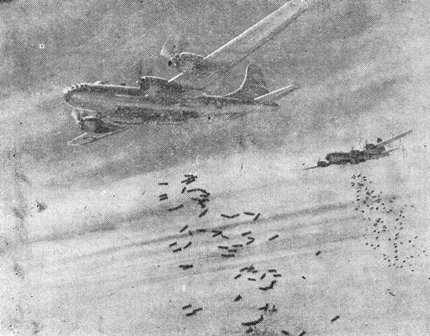
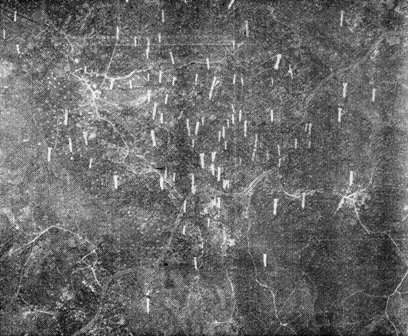 LIKE FLAKES OF SNOW. Spectacular photo, left, shows tons of bombs as they spew from the yawning bomb bays
of the XX Bomber Commands "Big B's." Right, scores of bombs dropping through space to hit a Japanese supply
depot near the Mingaldon airfield north of Rangoon. The giant bombers, operating in daylight from India bases,
started large fires from ammunition dumps with one column of smoke reaching 10,000 feet. Returning flyers
declared it a perfect mission from the standpoint of weather and observed results of bombs on target.
LIKE FLAKES OF SNOW. Spectacular photo, left, shows tons of bombs as they spew from the yawning bomb bays
of the XX Bomber Commands "Big B's." Right, scores of bombs dropping through space to hit a Japanese supply
depot near the Mingaldon airfield north of Rangoon. The giant bombers, operating in daylight from India bases,
started large fires from ammunition dumps with one column of smoke reaching 10,000 feet. Returning flyers
declared it a perfect mission from the standpoint of weather and observed results of bombs on target.